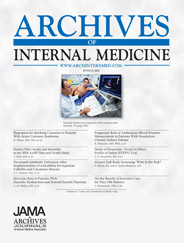 In a quote that has become part of medical school orientations everywhere, David Sackett, often referred to as the “father of evidence-based medicine,” once famously said:
In a quote that has become part of medical school orientations everywhere, David Sackett, often referred to as the “father of evidence-based medicine,” once famously said:
Half of what you’ll learn in medical school will be shown to be either dead wrong or out of date within five years of your graduation; the trouble is that nobody can tell you which half–so the most important thing to learn is how to learn on your own.
Sackett, we are fairly sure, was making an intentionally wild estimate when he said “half.” [See note about these strikethroughs at bottom of post.] But aA fascinating study out today in the Archives of Internal Medicine gives a clue as to the real figuresuggests that he may have been closer than any of us imagined. Continue reading So how often does medical consensus turn out to be wrong?







